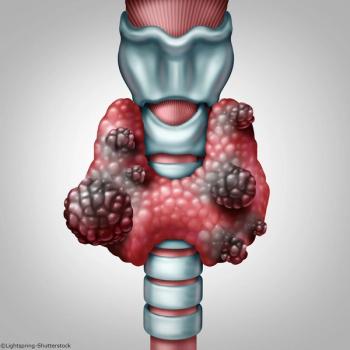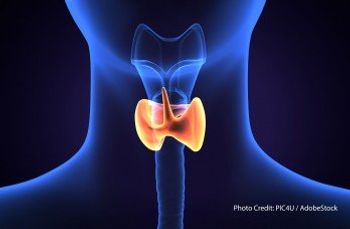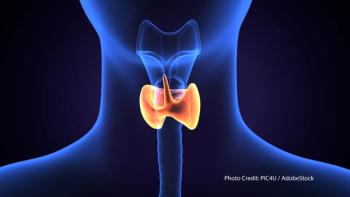
Eric J. Sherman, MD, on Agents for Treating RET Fusion–Positive Thyroid Cancer
Eric J. Sherman, MD, highlights several drugs that are being used to treat RET-positive thyroid cancer.

Your AI-Trained Oncology Knowledge Connection!


Eric J. Sherman, MD, highlights several drugs that are being used to treat RET-positive thyroid cancer.

Responses to selpercatinib in patients with pretreated medullary thyroid cancer were noted irrespective of therapy regimens received in prior lines, according to data from the 2021 ASCO Annual Meeting.

An affinity-tuned CAR T-cell product will be evaluated in thyroid cancer with a fast track designation from the FDA.

Investigators observed a survival benefit for patients receiving lenvatinib who had radioiodine-refractory differentiated thyroid cancer with lung metastases of 1 cm or greater.

“Although previous trials demonstrated that the prior version of the DNA-RNA test was more specific than the prior version of the RNA test, the current molecular test techniques have no statistically significant difference in performance,” wrote Masha J. Livhits, MD, and colleagues.

The FDA granted accelerated approval to pralsetinib to treat with advanced or metastatic RET-mutant medullary thyroid cancer or RET fusion-positive thyroid cancer.

The FDA approved the first therapy to treat cancers with rearranged during transfection (RET) gene alterations.

In a paper published in The BMJ, the authors provide a summary for the diagnosis, treatment, and monitoring of thyroid nodules.

The perceptions, which were associated with worry and a decreased quality of life, indicated the need for patient education that is suitable for diverse populations and improved risk communication by physicians.

A new gene mutation, DUOX2, may cause a type of familial thyroid cancer, according to study results published in Cancer Research.

Machine learning of ultrasound scans could provide a preliminary method of screening for thyroid cancer.

While there have been increases in the amount of thyroid cancer cases detected, there is still work for oncologists to do – namely to ensure there is adequate evaluation of the disease at diagnosis.

Researchers look at how mutation status can influence responses to targeted therapy in thyroid cancer.

Genetic profiles of thyroid cancer shed light on molecular mechanisms.

Most recently, the FDA approved cabozantinib for the treatment of HCC, but this drug has a history.

A new orally active inverse agonist of estrogen-related receptor gamma (ERRү) called DN200434 shows promise with regard to the diagnosis and treatment of anaplastic thyroid cancer.

In late 2015, the American Thyroid Association (ATA) changed guideline recommendations trying to rein in overly aggressive treatment of thyroid cancers that are low risk, offering the choice of hemithyroidectomy as an alternative to total thyroidectomy in these patients. In participating hospitals, the rates of hemithyroidectomy went up.

Researchers examined several studies of patients with Graves' Disease to see the prevalence of thyroid cancer in this population.

Alan N. Peiris, MD spoke with ONCOLOGY about guidelines and strategies for treating patients who have had thyroid cancer.


Researchers surveyed patients who underwent surgery for thyroid cancer and found a high number reported voice abnormalities post-operation.



Findings on the efficacy of the RET inhibitor BLU-667 in RET-altered medullary thyroid cancer and papillary thyroid cancer patients was presented at ASCO 2019.

Despite better detection, the incidence of pediatric thyroid cancer increased by 9.5% per year from 2006 to 2013 compared with 1.1% per year from 1973 to 2006.